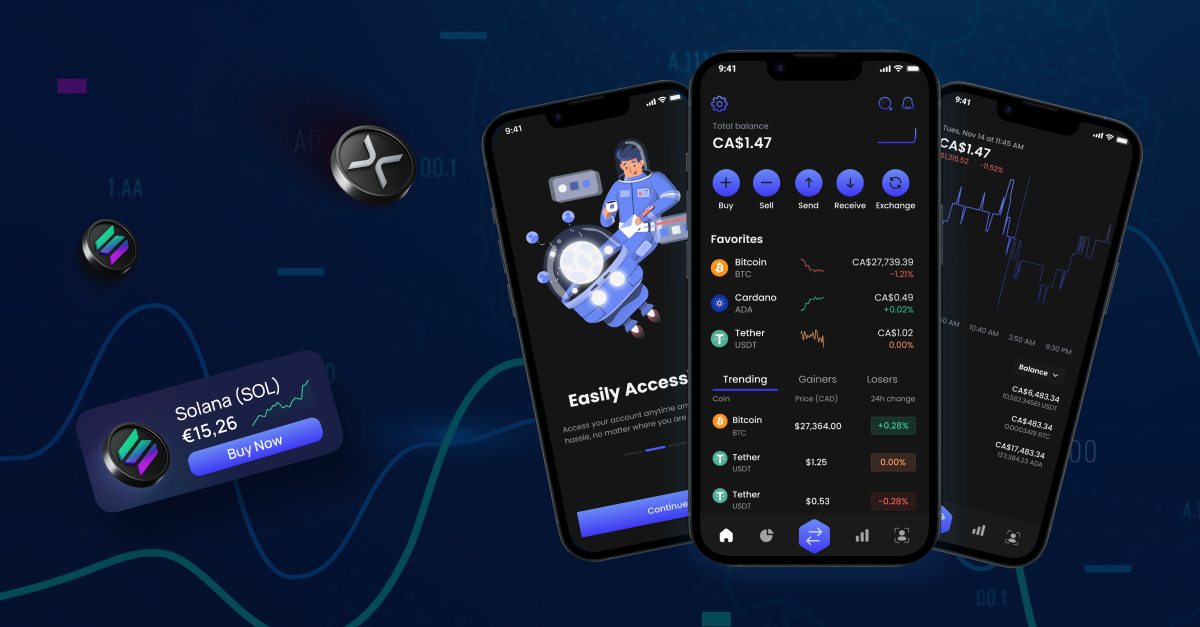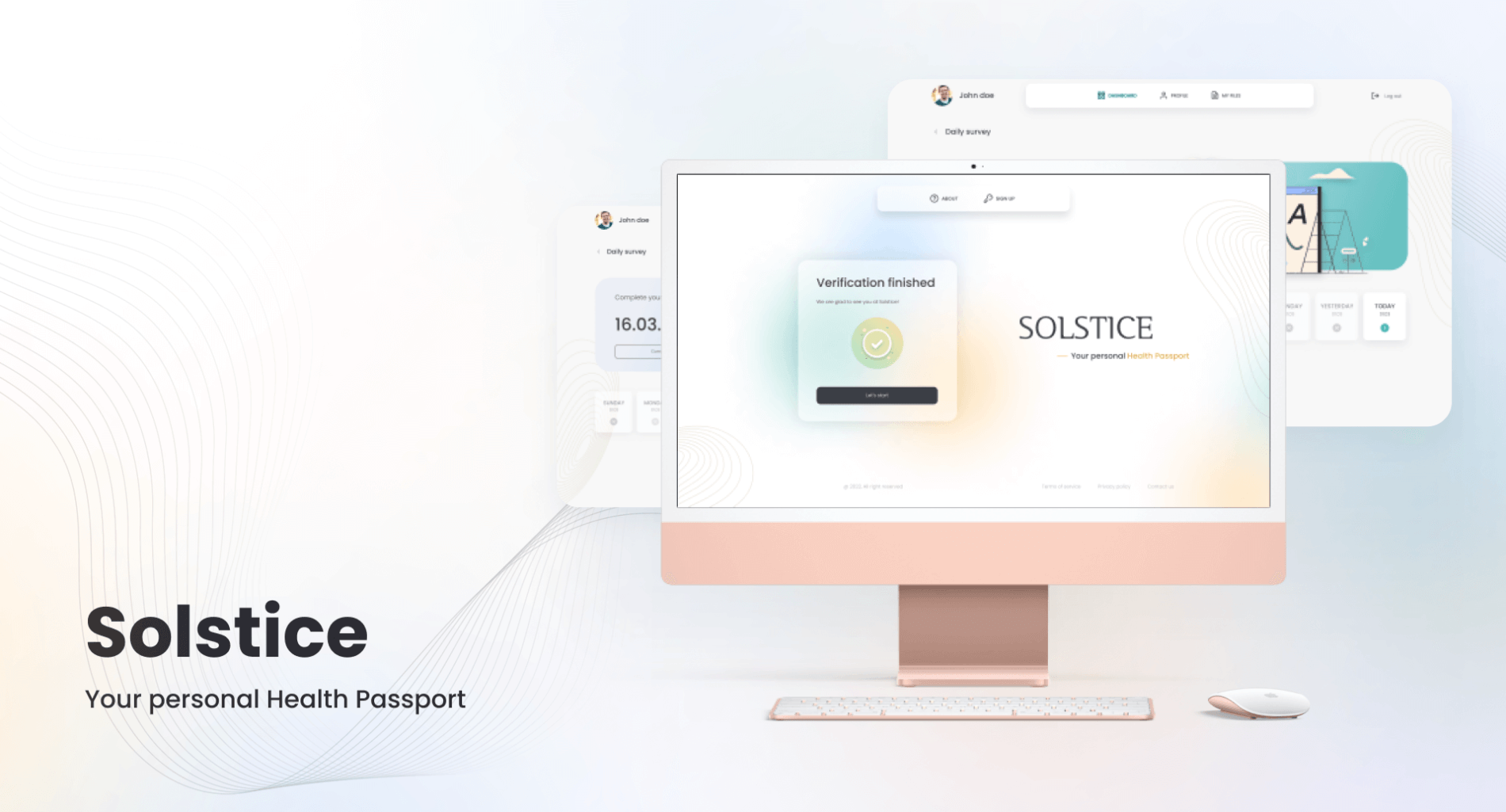Blockchain is finding more and more applications in the modern world, primarily due to the incredible value this technology can bring to various industries. This article will look at different aspects of blockchain in health insurance.
 CAGR of 68.40%
CAGR of 68.40%
Blockchain in the healthcare market’s annual growth rate of 68% is projected from 2023 to 2030.
 40% of market share
40% of market share
The biopharmaceutical & medical device companies segment holds 40% of the market share.
 126.02 billion
126.02 billion
Blockchain revenue in the healthcare market is forecasted to reach USD 126.02 billion in 2030.
What is Blockchain?
Blockchain is a decentralized and digital ledger that stores information about transactions in so-called blocks created through mining.
Blocks
Block is a compilation of verified transactions that miners or validators have added to the network. Each contains a distinct digital signature, known as a hash, the prior block’s hash, a timestamp, and a list of verified transactions.
Blocks link together using a cryptographic algorithm, forming a linear chain. Since each block derives from the previous block’s hash, the blockchain maintains an unchangeable and transparent record of all network transactions.

Connection
In a blockchain network, nodes directly connect to form a peer-to-peer network. Whenever a node intends to add a new transaction or block to the blockchain, it broadcasts the information to all other nodes in the network. Every node then verifies the transaction or block and adds it to its copy of the blockchain.
Peer-to-peer connections assist in ensuring that the blockchain remains secure and decentralized. Because there is no central authority, manipulating the network is challenging for any individual entity. Moreover, having several nodes validate transactions aids in avoiding errors or incidents of fraud.
Smart Contracts
A smart contract is a code that executes automatically and manages the terms of an agreement between parties. It is stored on a blockchain and can be customized to activate specific actions when predefined conditions are met.Smart contracts facilitate cost-effective transactions by eliminating intermediaries such as banks or lawyers, who typically require additional fees.
How Can Blockchain Benefit the Insurance Industry?
Improved Data Management
Managing large amounts of data across different systems and connections between other databases are significant challenges of blockchain in healthcare and insurance. Blockchain technology can enhance data management by creating a decentralized platform for data storage and sharing.
Smart Contracts Usage
Improved risk assessment is facilitated by smart contracts, which gain access to real-time data from multiple sources to enhance accuracy and customize insurance policies. A smart contract can incorporate weather data to automatically modify homeowner’s insurance premiums based on the likelihood of natural disasters in a given location.
Improved Safety
The blockchain stores all transactions that have ever taken place on it, which, combined with the same access to information in a peer-to-peer network, makes it difficult for fraudsters to manipulate data or submit false claims, as any attempt to do so would be immediately visible to all participants in the network.
The decentralized nature of the blockchain prevents a complete loss of control over the network because of the numerous nodes involved in the process. Validating transactions requires the majority of nodes to approve it, making it impossible for fraudulent transactions to be validated without controlling most of the nodes.
How Can Blockchain Help Insurers Get the Basics Right?
-
Communication With Audience
Insurance companies must communicate with their audience to enhance service quality and establish long-term growth strategies. Blockchain surveys are transparent and immutable, guaranteeing that user information is precisely collected without manipulation.
The private type of blockchain, in which the network operator sends invitations to join the network, is especially appropriate for this purpose. The invitation can be personalized to require registration or identity verification, removing the risk of redundant votes. Transparency further enables every node in the network to verify that the data has not been tampered with post-completion of the survey.
-
Competitive Pricing
One of the primary goals for insurers is to maintain competitiveness within their business. Implementing smart contracts on the blockchain can enable automated processing of routine tasks such as application opening and closing.
Furthermore, using blockchain technology allows for the elimination of a third party to validate transactions. Once the criteria stated in its code are fulfilled, a smart contract will instantly verify the transaction.
-
Strategic Partnerships
Companies can collaborate and invest in blockchain app development services to create a consortium network. This type of blockchain for insurance companies operates on a multi-tier principle; the first level is a private network within a single organization. It exchanges data between the organization’s nodes and forwards information to the second level.
At this second level, the private blockchains of different companies are united in a single consortium. The network consists of nodes representing individual companies, each with one trusted member. The exchange of data occurs at this level, facilitating communication and collaboration among the participating companies.
-
Innovations Implementation
The implementation of modern technologies helps companies stay relevant and ready for the implementation of Web3 development solutions. Blockchain is a promising platform for incorporating modern technologies, like AI, machine learning, and biometric authentication.
AI can analyze the data entered into the blockchain or integrated API and, combined with machine learning, can provide an extensive dataset for further study. This information can also be utilized to automate transactions. For instance, a customer insures their crops against a monthly drought. The AI reads data from a trusted methodology service’s API, and if a drought occurs, the information is sent to a smart contract that automatically approves policy payments.
Biometric authentication simplifies authentication and authorization processes. During registration, the system records a client’s biometric data, such as their fingerprint, facial recognition, or voice pattern. This data is then stored in a special blockchain storage and exchanged for a token that serves as a link to the data. This ensures that only the authorized user has access to the hidden data. Users can easily authenticate themselves within the application by speaking a few words or using the camera to scan their faces, unmatching classic means like passwords and PIN codes, which can be duplicated.
How is Blockchain Technology Being Implemented in Insurance?
By leveraging smart contracts, blockchain can automatically verify transaction details and reconcile them with the corresponding policy, decreasing the necessity for manual intervention. Furthermore, the transparency feature of blockchain enables all parties to access identical data, thereby fostering trust and collaboration among insurers, policyholders, and other stakeholders.
Blockchain helpful in Payment reconciliation to verifying the insurer’s payment to a policyholder, healthcare provider, or other entity matches the amount due based on their insurance coverage. This includes comparing the payment details to the invoice or claim submitted.
Blockchain in insurance enables efficient and secure claims data record keeping. This aids the industry in tracking claims history, leading to improved analysis of trends and insights in fraud detection. Parametric insurance applies predefined parameters that activate automatic payouts during specific events, like natural disasters or weather events.

How Can Blockchain Help Carriers Innovate?
Improved Supply Chain Management
Utilizing blockchain technology creates an unchangeable and clear record of all transactions, allowing carriers to monitor shipments more precisely and transparently from the beginning to the end.
Enhanced Security
The cryptographic protocols utilized in blockchain technology render it nearly impossible for anyone to tamper with the records stored on the blockchain. Compared to traditional systems, this enhances the security of sensitive data like shipment information, payment details, and customer information.
Smart contracts can further augment security and decrease the risk of fraud by automating processes and executing transactions based on predetermined rules.
Faster and Cheaper Transactions
Blockchain allows carriers to transact directly with each other, resulting in faster and more cost-effective transactions without fees. Additionally, transactions are settled quickly because the decentralized nature of the blockchain doesn’t require a central authority for validation.
Blockchain Solutions for Healthcare
Companies offering healthcare software development services can create a robust system for supply chain management and clinical trial management:
-
1 Secure Data Sharing
Providers can utilize a permissioned blockchain for healthcare to securely share patient data with each other, eliminating the need to depend on a central authority for data management and security. Each network participant would possess their own private key, which they would use to authenticate themselves and sign transactions.
-
2 Supply Chain Management
Blockchain healthcare solutions can create a tamper-proof record of the entire supply chain journey, from manufacturer to distributor to patient. Each product can be given a unique digital identifier, which can be tracked using a distributed ledger system. This could also make blockchain in medicine precious, as meticulous tracking could minimize the possibility of leaking specialty medications.
-
3 Clinical Trials
Blockchain technology in healthcare can securely store and share data from clinical trials, including patient data, clinical trial results, and regulatory compliance information. Each data point can be timestamped and stored in a decentralized ledger, ensuring that it cannot be altered or tampered with.
Top of the best clinical trials blockchain solutions for healthcare:
- Pfizer
- Healthereum
- Guardtime
-
4 Medical Records
Blockchain healthcare projects can give patients greater control over their medical records by giving them a digital identity tied to their medical records. Patients can grant access to different healthcare providers and organizations as needed without worrying about their data being compromised. Providers can also use blockchain applications in healthcare to keep track of patient records and for data exchanging.
Blockchain use cases in healthcare:
- Medicalchain
- IBM Watson Health
- Gem Health
- SimplyVital Health
- Nebula Genomics
-
5 Telemedicine
Blockchain technology can be used to enable secure and decentralized telemedicine consultations between patients and healthcare providers. Patients can create a digital identity that is linked to their medical records, and healthcare providers can use smart contract development to create an automated platform for consultation processes. This can reduce the need for face-to-face consultations and increase access to healthcare in remote areas.
Telemedicine is an appealing niche for blockchain healthcare startups because it provides convenient and accessible medical care, particularly for underserved and rural populations. It enables blockchain healthcare companies to broaden operations, offer more specialized services, like real-time health monitoring, and attain improved patient outcomes.
-
6 Non-Fungible Token (NFT)
Businesses can use NFT token development services to create online marketplaces, enabling patients to sell healthcare information to providers, researchers, and pharmaceutical companies. This will monetize the data and furnish valuable insights to healthcare providers.
Additionally, NFTs can track clinical trials in real-time, enhancing transparency and accountability. Innovations such as implementing smart contracts for healthcare transactions, monitoring medical devices using NFTs, providing patient loyalty programs, and utilizing NFTs for remote patient monitoring are also plausible.
How Can Interexy Help the Insurance Industry Develop Blockchain Capabilities?
-
At Interexy, our team has vast expertise in creating cutting-edge blockchain solutions for diverse industries. We are open to custom application ideas and provide healthcare, blockchain, and fintech app development services. We can assist insurance companies in integrating blockchain capabilities into their operations and services to boost efficiency and performance.
-
We also provide our experts to help insurance companies navigate new blockchain-based processes. With Interexy, insurance companies can leverage the advantages of blockchain technology to stay competitive in the swiftly changing insurance industry.
-
Our team of blockchain experts offers consultation on implementing blockchain technology, creating custom solutions that meet unique requirements, and ensuring complete integration with existing systems.
Hire Blockchain Dedicated Team
Wrapping Up
The future of blockchain in healthcare and insurance would offer numerous advantages, such as heightened transparency, automation, and improved data privacy. Furthermore, the technology has the potential to fulfill fundamental requirements of the insurance business, including audience communication, innovation, and cost reduction.
Overall, blockchain in healthcare today is a promising platform for introducing advanced technologies and establishing compatibility between platforms and legacy systems.
FAQs
-
What is the main problem blockchain technology helps solve?
Blockchain technology solves the problem of trust and security in digital transactions. Traditional methods typically require a central authority, like a bank or government agency, to verify the transaction’s authenticity and validity, leading to a single point of failure and potential vulnerability to cyberattacks, fraud, and corruption.
-
What are the main benefits of blockchain in healthcare?
The implementation of blockchain technology in healthcare provides numerous benefits. It enables the safe transfer of medical information between separate entities, like healthcare providers and facilities, while ensuring the privacy and security of that data.
Furthermore, blockchain has the potential to enhance interoperability between electronic medical record systems, streamlining the process of data sharing. Blockchain technology can track the movement of drugs and materials in the supply chain, ensuring transparency and traceability.
-
What is blockchain in healthcare and life insurance?
Blockchain technology is utilized in healthcare and life insurance to manage and store data securely and efficiently. It involves the use of a distributed ledger technology known as blockchain. The technology can help companies improve data privacy, security, and interoperability while decreasing administrative costs thanks to real-time claims processing. This technology empowers patients to have complete control of their medical records, enabling them to share or withhold information at their discretion.
Written by
Domi Petocz / Blockchain Department Lead
“I’m a Blockchain Developer with 7+ years of being in touch with Web3, writing smart contracts on Solidity. I’ve been developing tokenomics from scratch for ERC-20 tokens, ICO, DAO, NFT marketplaces, and fundraisings integrating it with top DeFi protocols like Uniswap/Lido/Chainlink”.







